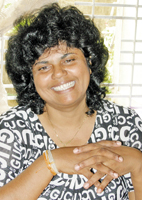Instilling confidence in women, that’s her goal
As a founder of the Saviya Development Foundation and the driving force behind the Saviya Women’s Organisation, Rupika Damayanthi De Silva has had her fair share of opposition-simply for being a woman. Yet, it is the courage and resilience of the women she meets that keeps her going.

Rupika: Started community work from a young age.
For her efforts as a community leader and social worker, Rupika was recently awarded the prestigious N-Peace Award in the Philippines as a Role Model for Peace. Her innovative exchange programme in 2002 that saw women from the North and the South crossing borders to live for a week in each other’s homes and experience each other’s communities, played a major role in securing for her the prestigious award.
Along with four other awardees from across the Asia Pacific, Rupika was recognised for her exemplary work in the field of peace building through her brainchild, the Saviya Women’s Organisation. The N-Peace Award is granted to individuals who have made exemplary strides in the fields of peace and community cooperation.
Rupika was honoured for her community services, inter-society programmes and community projects implemented towards women’s empowerment.
Speaking from her beloved Saviya Foundation in Galle, Rupika is modestly proud of this accolade that follows many others that she has been awarded in the past few years. Growing up in Balapitiya, she was heavily involved in her community from a young age, holding several leadership posts in school and university. At the University of Ruhuna, she studied Social Services and Community Development; knowing this was the area of work she wanted to be involved in one day.
In 1987 she joined the Sarvodaya Foundation on request, and this was where she met her husband-to-be Winston De Silva. Mr. De Silva, a dedicated community leader and social worker was inspired by Sarvodaya to set up his own foundation. With their shared vision, the De Silvas established Saviya in 1991. Saviya’s scope of work has no definition or set boundary, with Rupika describing the work they do as ‘expansive and multi-faceted’.
The community-based charity operating predominantly in Galle and Matara works to fulfil the basic needs of the low income category whilst engaging with the community in areas of poverty alleviation, environment development and conservation, human rights, community health care, youth empowerment, micro finance, enterprise development, and rehabilitation. Their success has garnered them special consultative status from the UN-ECOSOC.
In those early years of Saviya, Rupika was unable to get as fully involved as she would have liked – being a wife and mother came first, she admits with no regrets. “My children were very young and needed my attention and of course they were my priority,” she smiles. Later, when her two sons and daughter were older and more independent Rupika would become a vital figure in Saviya’s journey forward. She would go on to form the Saviya Women’s Organisation that was affiliated to its parent organisation, but functioned exclusively in the arena of women’s development.
In 2002 Rupika pioneered ‘Kantha Handa’ (Women’s Voice), a groundbreaking exchange programme that would see 100 women from the South travel to the North and East of the country, living with their counterparts from those areas for a week and experiencing their culture and way of life. Later, a corresponding number from the North and the East travelled to the South, where they in turn were given the same hospitality by the friends they had made earlier.
“It was very successful,” says Rupika of the programme. “Not just because they integrated so well into each other’s cultures, but also because they kept in contact afterwards. That was the real fruit of our effort.” These women also exchanged products they had made themselves, a strong reflection of Saviya’s efforts to boost the economy for women they work with. In 2013 Round 2 of the exchange programme will commence, for some have lost touch after the war and Rupika hopes to rebuild those relationships.
Rupika lights up when she speaks about the women she works with. “Women are very strong. They can withstand so much pressure, even if traditionally they’re not built to do that.”
“As a woman, I’m not looking to change everything about me and become just another man. I’m not going to go on protest marches and shout slogans. Eva boru weda (those are pointless). ” She points at a picture wall of the Saviya women, effortlessly operating a drill and cladding aluminum, their faces covered with protective masks.
“But I want to instil in women confidence–that they are just as good as any man, that they can accomplish the same things and reap the same benefits. And I want society to treat them with the equality they deserve. To give them equal pay and equal opportunities. If women can have an equal shot at living a good life and enjoying everything that’s beautiful about it; then as a society we can achieve many great things.”
The award
 The N-Peace Awards were held on October 9 in Manila, Philippines. Rupika De Silva and her counterparts, the Role Models for Peace, received their awards from Philippines President Benigno S. Aquino. The N-Peace Award was inaugurated in 2011 by the United Nations Development Programme (UNDP) for Asia Pacific for peace and community cooperation spearheaded by women. The four other individuals honoured as Role Models of Peace at this year’s N-Peace Awards were Teresita Deles (Philippines), Suraiya Kamaruzzaman (Indonesia), Radha Paudel(Nepal) and Mana Lou (Timor-Leste). |
Follow @timesonlinelk
comments powered by Disqus



























